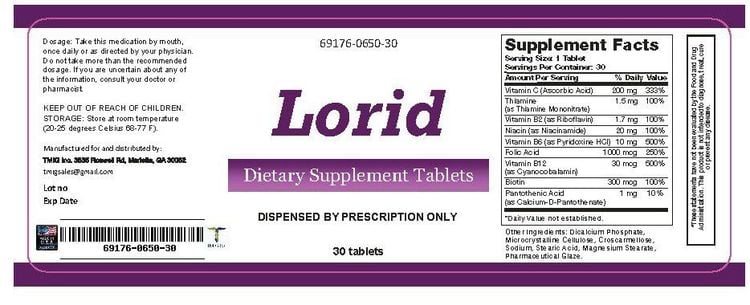This is an automatically translated article.
Inadequate diet or due to some diseases cause our body to lack substances, including vitamins. Some severe cases may require the use of vitamin supplements such as Lorid. So what does Lorid do?
1. What does Lorid do?
What is the effect of Lorid? Lorid is the name of a multivitamin product, which is used to treat or prevent vitamin deficiencies. Causes of vitamin deficiency include: poor diet, certain medical conditions or women during pregnancy. Vitamins are one of the important ingredients that help build the body and maintain normal health.
2. How to use Lorid
Lorid is a drug that is used orally, only used once a day or as prescribed by a doctor. Users need to follow all instructions on the product packaging or take it as prescribed by a doctor. Absolutely do not arbitrarily use Lorid in excess of the recommended dose. If you have any questions about Lorid, please consult your doctor or pharmacist for answers.
Lorid drug needs to be used regularly and continuously every day to be effective. To help users remember, get in the habit of taking Lorid at the same time each day.

Thuốc Lorid chỉ được uống 1 lần mỗi ngày
3. Lorid side effects
Common undesirable effects of Lorid include: constipation, diarrhea or abdominal pain. However, these signs are only temporary and will go away as the user's body adapts to the Lorid drug. Therefore, if any of these signs persist or get worse, contact your doctor or pharmacist immediately.
If the treating doctor has prescribed Lorid, the patient should remember that the benefits of the drug will outweigh the harms of the side effects. Lots of people use Lorid and there are no serious side effects.
Serious drug allergy to Lorid is very rare. However, call your healthcare provider right away if you have signs of an allergic reaction, including: localized or generalized rash, itching and swelling of body parts (especially face/face) tongue/throat), dizziness, difficulty breathing. In addition to the listed side effects, if you may experience any other unusual symptoms, contact your doctor or pharmacist for instructions.
4. Some notes when using Lorid . products
Before using Lorid medicinal products, users need to be aware of allergies to drugs and ingredients in the drug, allergy to soy, peanuts or any other allergies. Lorid medicinal products may contain various ingredients that may cause allergic reactions or other problems in some people.
Some health problems to be aware of with your doctor before starting to use Lorid, especially:
Use or abuse of alcohol: Liver problems; Stomach/intestinal problems (eg, ulcers, colitis). Some brands of multivitamins contain folic acid, so before using Lorid, talk to your doctor or pharmacist if you have a vitamin B12 deficiency (a form of pernicious anemia). Folic acid may interfere with certain laboratory tests for vitamin B12 deficiency and lead to diagnostic and therapeutic errors. If left untreated, vitamin B12 deficiency can lead to serious neurological problems (eg, peripheral neuropathy).
Inform the doctor if the user is pregnant before using Lorid. Besides, Lorid can pass into breast milk, so consult your doctor before breast-feeding.

Người lạm dụng rượu bia nên lưu ý khi dùng thuốc Lorid
5. Lorid Drug Interactions
Drug interactions are important factors that affect the activity or increase the risk of serious side effects of any drug, including Lorid. Please keep a list of all products you are taking with Lorid and share it with your doctor and pharmacist. Do not use, stop or change the dose of any medication while using Lorid without your doctor's approval.
Some products that may interact with Lorid drugs are: other vitamins or nutritional supplements. Multivitamin brands often contain iron, so avoid taking Lorid products at the same time as antacids, bisphosphonates (e.g. alendronate), levodopa, thyroid medication (e.g. levothyroxine) or certain antibiotics. (eg, tetracycline, quinolones such as ciprofloxacin). Talk to your doctor or pharmacist about waiting times between doses and find a dosing schedule that works for you.
Lorid contains folic acid, so talk to your doctor or pharmacist if you are taking certain anti-seizure medications (including hydantoins such as phenytoin). Lorid may interfere with certain laboratory tests and cause erroneous results. Make sure laboratory staff and all physicians know the patient is taking this medication. Symptoms of Lorid overdose may include: stomach pain, nausea, vomiting, diarrhea.
If a doctor has prescribed Lorid, the user absolutely should not take it or share it with others. Lorid products are not suitable as a substitute for a normal diet. It is best to get vitamins from healthy foods, maintain a balanced diet, and follow the nutritional guidelines as directed by your doctor.
If you are taking Lorid on schedule and miss a dose, take it as soon as you remember. If it is almost time for your next dose of Lorid, skip the missed dose and do not double the dose to make up for it. Store Lorid at room temperature from 15-30 degrees Celsius, avoid direct light and high humidity.
Please dial HOTLINE for more information or register for an appointment HERE. Download MyVinmec app to make appointments faster and to manage your bookings easily.
Reference source: webmd.com













